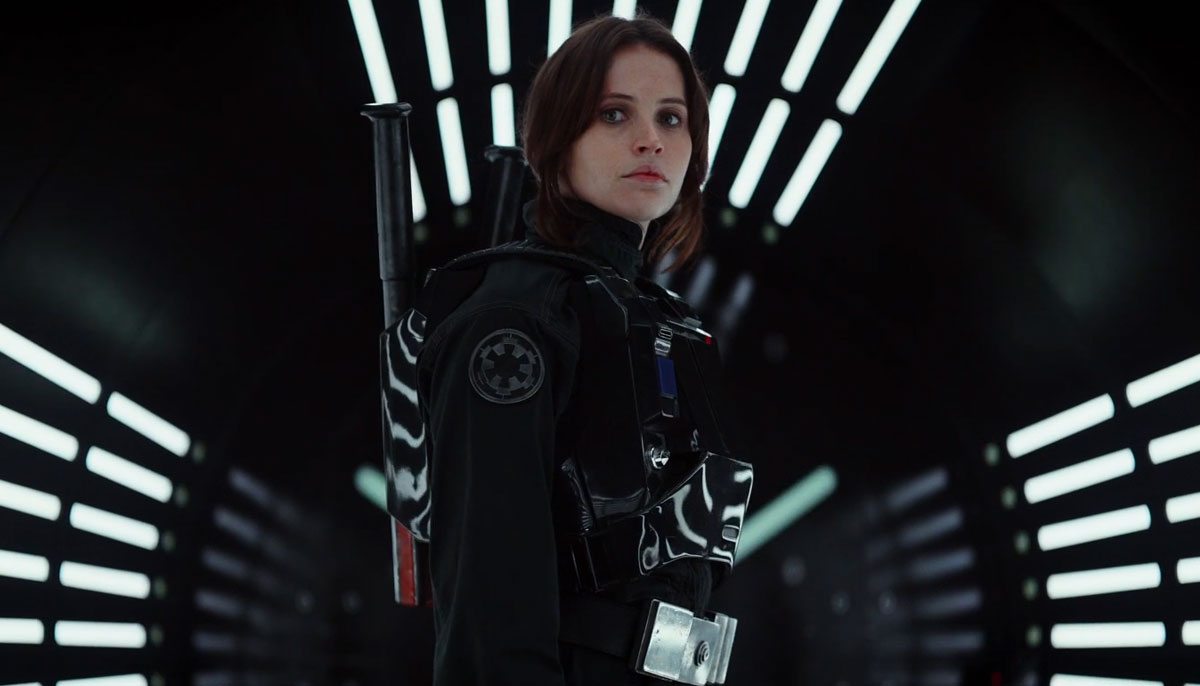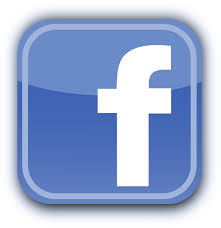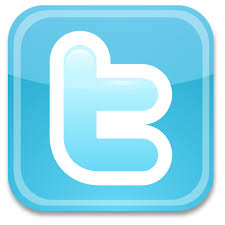
 Rogue One is a Star Wars prequel that spins off of
the line at the beginning of the original Star Wars (Episode IV) that
mentions that rebel spies stole the secret plans for the Death Star.
This one has no title crawl, as it isn't a part of the chapters that
the Skywalker saga had been about, though it does flesh out the middle
ground between Episodes III and IV.
Rogue One is a Star Wars prequel that spins off of
the line at the beginning of the original Star Wars (Episode IV) that
mentions that rebel spies stole the secret plans for the Death Star.
This one has no title crawl, as it isn't a part of the chapters that
the Skywalker saga had been about, though it does flesh out the middle
ground between Episodes III and IV.
Felicity
Jones (Inferno,
The Theory of Everything) stars as Jyn Erso, daughter of Galen Erso
(Mikkelsen, Doctor Strange), a
scientist-turned-farmer who once reluctantly helped design the Death
Star for the Empire. Jyn had run away from harm when her father had
been captured, under the iron hand of the director of the massive
weapon project, Orson Krennic (Mendelsohn,
Slow West), who expects Galen to finish what he
started. We catch up with her later, as an adult, having been trained
by Saw Gerrera (Whitaker, Arrival)
on the ways of the solider, then imprisoned, but
Cassian Andor (Luna, Blood Father), an espionage agent working for the the Rebel Alliance,
sees her potentially helping their side to find the scientist,
assembling a rag-tag team of fighters to go on a mission to snatch the
blueprints, including one that exploits an Achilles Heel, from the
Death Star before it wreaks havoc on a terrified Rebel Alliance.
The rousing score from John Williams has been replaced by the scoring
of Michael Giacchino (Star Trek
Beyond, Zootopia), though the original score does return from time
to time to remind us of how much more effective it is than anything
new that we're hearing now. It's just one of the reasons why the first
2/3 of Rogue One fails to generate the kind of excitement that we're
accustomed to seeing from the prior seven films in the main Star Wars
arc. The final 45 minutes are a different story, where battles in
space and on land begin to take over, upping the tempo of what has
come before, and actually generating a modicum of interest in seeing
the coursing battles rage across space, land and tropical islands
(yes, there are major skirmishes near water in this one). It's no
secret that the folks at Disney weren't exactly happy with the product
that director Gareth Edwards (Godzilla,
Monsters) had turned in, ordering reshoots to gin
up some excitement before unleashing Rogue One to the eager, ravenous
fans.
On the down side of the film, in addition to the highly
publicized appearance of Darth Vader, there are a couple of smaller
roles within Rogue One that also feature characters in their visages
of how we see them in the 1977 release. Unfortunately, these
characters reside squarely in the Uncanny Valley of CGI characters,
nearly perfect in their resemblance to the actual actors in their Star
Wars costumes, but too obviously artificial in their facial
expressions and movements to keep from becoming distractions. Didn't
Disney learn their lessons on what not to do with CG representations
of well-known actors from Tron Legacy? If we're
going to recast younger versions of actors in other prequels and
spin-offs, it makes little sense for these characters to not be
portrayed by flesh-and-blood counterparts (much like Ewan McGregor
represented Alec Guinness as younger Obi-Wan, or soon-to-be Han Solo,
Alden Ehrenreich, will be replacing Harrison Ford.)
The
original Star Wars was a combination of many genre staples,
from swashbucklers, to cliffhanger serials, to Japanese samurai
flicks, to Westerns, all of them filtered through to extract the most
exciting of aspects into one glorified space opera hybrid, applying
Joseph Campbell's Heroes Journey as the template for epic
storytelling. Rogue One, while passably entertaining for fans
of the series, some of whom champion this film as one of the finest in
the big-screen releases because of the multitudinous Easter Eggs and
fan-service moments, is likely going to garner indifference from those
not already part of the cult of Star Wars, and disappointment among
many of those fans who prefer their Star Wars adventures to
crackle with lots of kinetic energy and whiz-bang elements of
discovery. As we've learned in this era of realistic visual effects
smorgasbords, it takes more than explosions and well-rendered alien
planets to get us to drop our jaws in wonderment.
One of the more disappointing elements is in seeing the tried-and-true
Dirty Dozen formula, done to hit-and-miss success earlier
this year with Suicide Squad, and last year in
Guardians
of the Galaxy, mostly squandered in Rogue One.
While certain members of the rag-tag team have their individual
moments to shine, the repartee among them as a collective feels mostly
absent, only giving hints of what might have been in the interactions
between Donnie Yen's (Flash Point) blind swordsman, Chirrut Imwe (the embodiment of
blind faith, as he believes in the Force in an era when Jedi are
merely a relic of the past), and Wen Jiang's (Chinese
Zodiac) gun-toting warrior Baze
Malbus, who believes only in the power produced when he squeezes his
trigger finger. Meanwhile, K-2SO shoots up to the top of the
heap of characters that bear watching, only because the droid is
improbably imbued with the most discernable personality among a human
cast of mostly stock characterizations.
In addition to the trouble with engaging characterizations, Edwards
has trouble building momentum or generating suspense for most of the
early run time of Rogue One, causing us to question just how
much of his original vision resides in the much more exciting final
third. Certain elements synonymous with the Star Wars
franchise are diminished, including the sense of fun, discovery,
adventure, as well as the universal appeal to younger viewers, many of
whom will likely stir anxiously in their seats for something to occur
on the screen that will captivate them. While the inert aspects
of Edwards' presentation doesn't carry all of the way through, there's
just a bit too much of it that permeates Rogue One to not
feel somewhat impatient for it to kick in an adrenaline rush.
Ultimately, despite being disappointed that Rogue One is
expendable and largely uninspired in its execution, there are enough
moments when it comes alive for me to give a mild recommendation for
fans of the franchise who are willing to take it in merely as a
traditional war film that plays around in the sandbox created by
George Lucas in the 1970s. That space battle is truly
magnificent, and the tropical island showdown for the ground troops
is, at the very least, something we haven't seen before.
There are also a good deal of nods to the fans of Star Wars,
who will no doubt find amusement and titillation in the many
references (Vader's presence brings an excitement not generated by any
other character in the film, and he's barely in it), though that is an
aspect that will certainly vary, depending on the level of knowledge
you bring into it. While I respect the effort to bring a new
story told in a different way, I don't think any future spin-offs
should follow suit because, if I'm being completely honest, had
Rogue One been the first Star Wars film, we'd likely
never see any others.
Qwipster's rating:







©2016 Vince Leo

 Rogue One is a Star Wars prequel that spins off of
the line at the beginning of the original
Rogue One is a Star Wars prequel that spins off of
the line at the beginning of the original